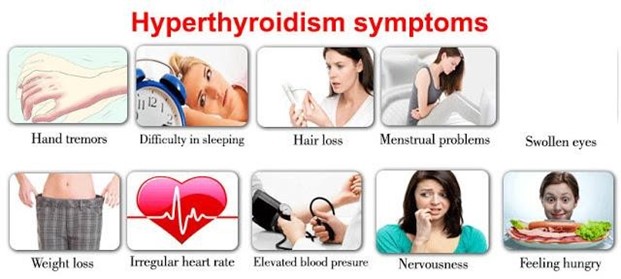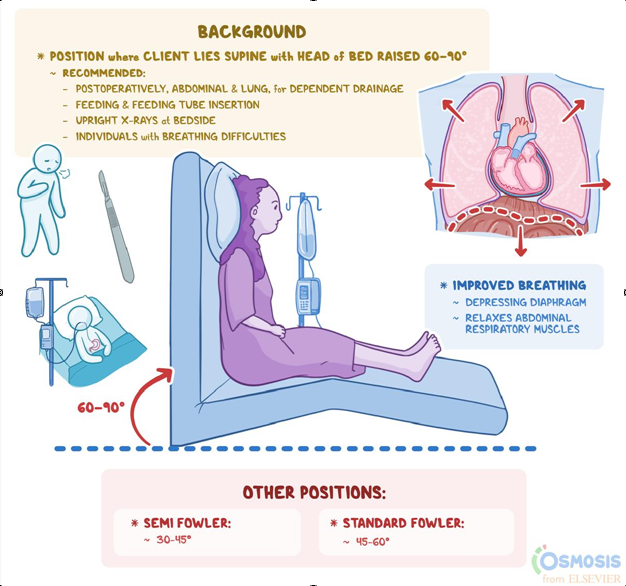A nurse is reinforcing teaching with a client who has hypothyroidism and a new prescription for levothyroxine.
The nurse should instruct the client to notify the provider of which of the following manifestations of thyrotoxicosis?
Nervousness
Pruritus
Cough
Polyuria
The Correct Answer is A
Explanation
A, Nervousness
Levothyroxine is a medication used to treat hypothyroidism, a condition in which the thyroid gland does not produce enough thyroid hormones. Thyrotoxicosis, on the other hand, is a condition characterized by an excess of thyroid hormones in the body, which can occur as a side effect of levothyroxine or other thyroid medications.
Nervousness is a common symptom of thyrotoxicosis. Excess thyroid hormones can lead to increased sympathetic nervous system activity, causing symptoms like nervousness, restlessness, anxiety, and palpitations.
Pruritus (itching) in (option B) is not correct because it is not a typical manifestation of thyrotoxicosis. Itching is not directly related to thyroid hormone levels and is more likely to be associated with other conditions or medication side effects.
Cough In (option C) is not correct because it is not a typical manifestation of thyrotoxicosis. Coughing is not a symptom directly related to thyroid hormone levels and is more likely to be associated with respiratory or other conditions.
Polyuria (increased urination) in (option D) is not correct because it is not a typical manifestation of thyrotoxicosis. Polyuria is not a symptom directly related to thyroid hormone levels and is more likely to be associated with other conditions, such as diabetes or kidney problems.
If the client experiences symptoms of thyrotoxicosis, such as nervousness, palpitations, or any other concerning signs, it is essential to notify the healthcare provider promptly. The provider may need to adjust the dosage of levothyroxine or consider other treatment options to address the excess thyroid hormone levels and ensure the client's well-been

Nursing Test Bank
Naxlex Comprehensive Predictor Exams
Related Questions
Correct Answer is C
Explanation
Phenytoin is known to cause gingival hyperplasia, which is characterized by swollen and enlarged gums. This side effect is more common in long-term use and may require dental care and regular oral hygiene practices.
Phenytoin is known to be associated with an increased risk of birth defects in babies born to women taking the medication during pregnancy. It is important for women of childbearing age to discuss the risks and benefits of phenytoin with their healthcare provider and use effective contraception to avoid pregnancy while taking the medication.
Phenytoin can affect liver function, so regular monitoring of liver enzymes and blood levels of the medication is necessary. The frequency of blood work may vary depending on the individual's specific situation, so it is important to follow the healthcare provider's instructions. It is not advisable to skip a dose of phenytoin without consulting a healthcare provider.
Abruptly stopping or missing doses of antiepileptic medications can lead to breakthrough seizures or other complications. Any changes in the medication regimen should be discussed with the healthcare provider.
Correct Answer is D
Explanation
Explanation
D. Maintain the client in high-Flower’s position
Crackles in the bases of the lungs, shortness of breath, and an increased respiratory rate are signs of pulmonary congestion, which is commonly seen in heart failure. Maintaining the client in a high-Fowler's position, with the head of the bed elevated to a 45-60-degree angle, helps reduce venous return to the heart, decreases fluid accumulation in the lungs, and improves breathing comfort for the client.
The other options are not appropriate actions for the client's condition:
Instructing the client to cough every 4 hours in (option A) is not the priority action in this situation. Coughing may not effectively address the underlying cause of pulmonary congestion and may not provide immediate relief for the client.
Encouraging the client to ambulate to loosen secretions in (option B) is not the priority action in this situation. While ambulation can be beneficial for overall health, the client's symptoms of pulmonary congestion require immediate attention to improve respiratory status.
Increasing the client's intake of oral fluids in (option C) is not the priority action in this situation. While maintaining adequate hydration is important, excessive fluid intake can worsen the symptoms of heart failure and contribute to further fluid accumulation in the lungs.
Therefore, the nurse should maintain the client in high-Fowler's position (option D) to promote optimal lung function and improve breathing comfort. It is important to promptly notify the healthcare provider of the client's condition for further assessment and intervention.

Whether you are a student looking to ace your exams or a practicing nurse seeking to enhance your expertise , our nursing education contents will empower you with the confidence and competence to make a difference in the lives of patients and become a respected leader in the healthcare field.
Visit Naxlex, invest in your future and unlock endless possibilities with our unparalleled nursing education contents today
Report Wrong Answer on the Current Question
Do you disagree with the answer? If yes, what is your expected answer? Explain.
Kindly be descriptive with the issue you are facing.
